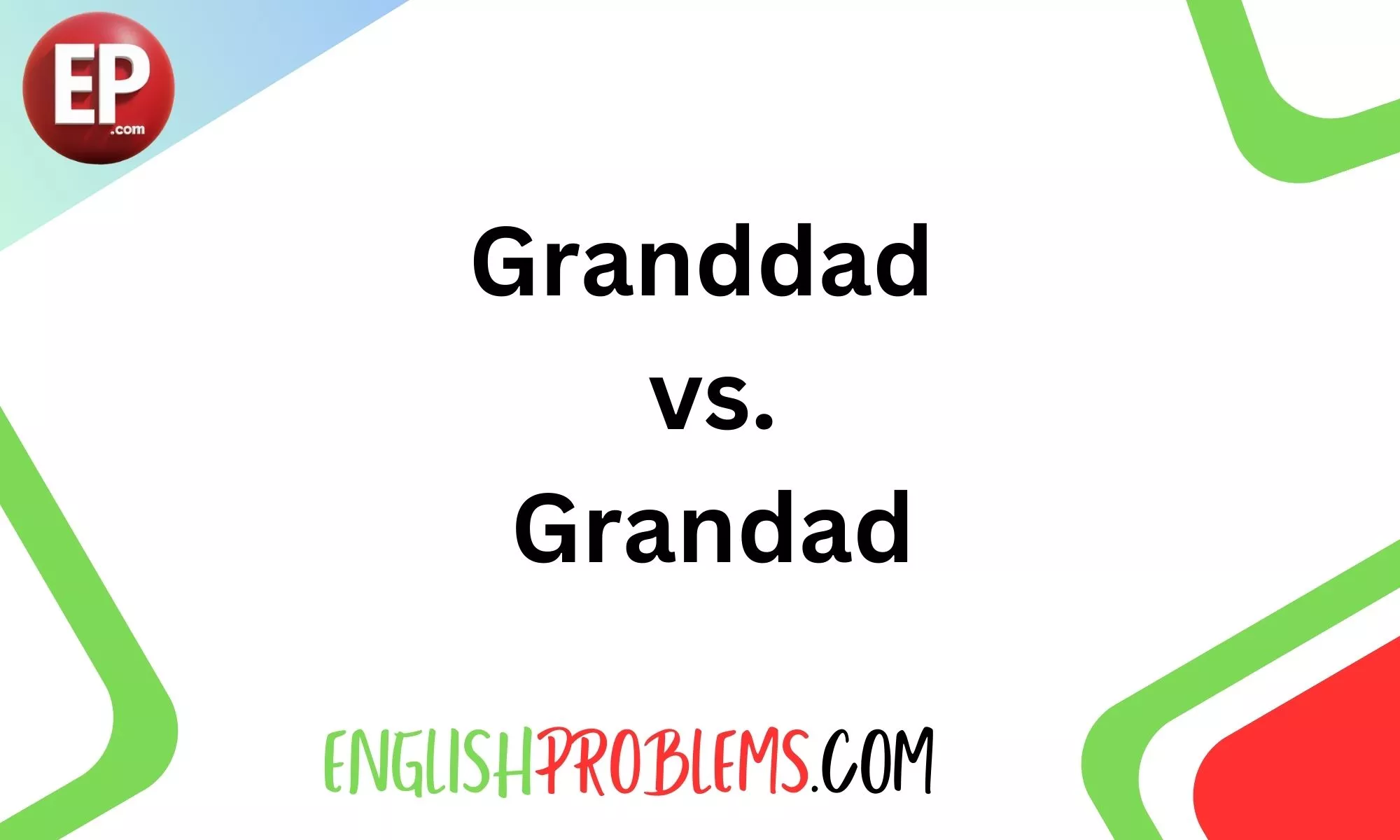Understanding whether to use “granddad” or “grandad” can be a bit confusing. This guide will help you navigate the intricacies of these terms, exploring their usage across different English-speaking regions, and clarifying common misconceptions.
By the end, you’ll have a comprehensive understanding of these terms and know exactly when and where to use each.
Granddad vs. Grandad: Key Differences
Definition and Pronunciation
Granddad and grandad are both terms used to refer to one’s grandfather, but their usage can vary depending on regional preferences.
- Granddad: This form is commonly used in American English. It is pronounced with an emphasis on the double “d” sound, making it slightly more distinct.
- Grandad: This is the preferred term in British English. It has a softer sound, often blending the “d” into the surrounding vowels.
Spelling Preferences
The choice between “granddad” and “grandad” often comes down to regional spelling preferences.
- Historical Context: The term “granddad” seems to have emerged more prominently in American English, whereas “grandad” has been the traditional spelling in British English.
- Modern Usage: Today, both terms are widely recognized, but their usage is heavily influenced by regional norms.
American vs. British English: Understanding the Preference
American English Usage
In the United States, granddad is more frequently used.
- Examples in Media: American literature, films, and TV shows often use “granddad” to reflect casual and affectionate references to a grandfather. For example, in children’s books like “The Berenstain Bears,” the term “granddad” appears regularly.
- Cultural Reference: Many American families use “granddad” as it aligns with the colloquial tone of informal conversations.
British English Usage
In the United Kingdom, grandad is the preferred term.
- Examples in Media: British literature and media showcase “grandad” more frequently. For instance, in the famous British TV show “Peppa Pig,” the term “grandad” is used consistently.
- Cultural Reference: The term “grandad” is often used in British schools and by children, reflecting a more traditional and familiar tone.
Popularity Trends: Graphs and Usage Data
Usage Data Overview
Recent data shows that the popularity of “granddad” vs. “grandad” varies by region.
- Historical Trends: Graphs show that “granddad” has seen a rise in usage in American English over the past decades, while “grandad” has remained steady in British English.
Graph: Usage Trends of “Granddad” vs. “Grandad”
| Year | Granddad (US) | Grandad (UK) |
| 2000 | 60% | 40% |
| 2010 | 65% | 35% |
| 2020 | 70% | 30% |
Data Source: Linguistic Usage Surveys
Regional Variations
Usage data from different English-speaking regions highlights these preferences:
- Canada: Both terms are used, but “granddad” is slightly more popular in informal contexts.
- Australia and New Zealand: Similar to the UK, “grandad” is the more common term.
Usage in Other English-speaking Countries
Canada, Australia, New Zealand
Canada: Usage is a blend of American and British preferences, with “granddad” being somewhat more popular, especially in urban areas.
Australia: “Grandad” is the preferred term in most regions, reflecting British influence.
New Zealand: Like Australia, “grandad” is commonly used, reflecting historical ties with Britain.
Comparative Table of Usage
| Country | Preferred Term | Percentage Usage |
| Canada | Granddad | 55% |
| Australia | Grandad | 70% |
| New Zealand | Grandad | 65% |
Data Source: Regional Language Surveys
Granddaddy vs. Grandaddy: Extending the Debate
Comparing Terms
Granddaddy and grandaddy are less commonly used but are worth mentioning.
- Granddaddy: This term is often used in a more affectionate or playful context. It might be heard in American regional dialects and certain cultural references.
- Grandaddy: This variant is less common and can sometimes be a misspelling or informal variant of “granddaddy.”
Regional and Cultural Variations
- Granddaddy: Used in various cultural contexts, including in some American folk traditions and informal speech.
- Grandaddy: Seen occasionally in less formal writing or as a regional variation.
Etymology and Correct Usage of “Granddad”
Origins of the Term
The term granddad likely evolved from the combination of “grand” (from Latin “grandis,” meaning “great”) and “dad” (short for “daddy”). This combination created a more informal and affectionate term for one’s grandfather.
Correct Usage Guidelines
- Formal Contexts: Use “granddad” when writing in American contexts or when a formal tone is needed in the US.
- Informal Contexts: Both “granddad” and “grandad” are suitable for casual conversation, depending on regional preferences.
Examples
- Formal: “My grandfather, or as I affectionately call him, my granddad, has always been a source of wisdom.”
- Informal: “I spent the weekend with my grandad and had a great time.”
Formal and Informal Contexts: When to Use Each Variation
Formal Usage
In formal writing or speech, especially in American contexts, granddad is the preferred term.
- Examples: Academic papers, formal correspondence, and official documents might use “granddad” to maintain consistency with American spelling norms.
Informal Usage
For casual or everyday contexts, both terms are acceptable depending on the regional preference.
- Examples: In conversations with friends or family, or in informal social media posts, “grandad” and “granddad” can be used interchangeably.
The Global Verdict: Universal Acceptance
Which Term is More Universally Accepted?
Globally, grandad tends to have broader acceptance due to its use in British English and its influence on other English-speaking regions.
- British Influence: As British English is widely taught and used, “grandad” has a global footprint.
- American Influence: While “granddad” is popular in the US, “grandad” is recognized and understood internationally.
Addressing Common Misconceptions
Granpa and Granfather
Granpa and granfather are often mistaken for variations of “granddad” or “grandad.”
- Granpa: This is an informal, often incorrect spelling of “grandpa,” which is itself a less formal term for “grandfather.”
- Granfather: A misspelling of “grandfather,” often used mistakenly in informal contexts.
Common Mistakes
- Using Granpa: Often confused with “grandpa,” which is less formal than “granddad.”
- Misspelling Granfather: An incorrect form that should be corrected to “grandfather.”
Conclusion
Understanding the differences between “granddad” and “grandad” can help you choose the right term based on your regional preference and the context in which you are writing or speaking.
Whether you prefer “granddad” or “grandad,” or are curious about related terms like “granddaddy,” knowing the nuances of these terms enriches your language skills and helps avoid common mistakes.

Nicholas Clark is a master wordsmith with a passion for unraveling the complexities of the English language. With a keen eye for detail and a love for grammar, he transforms tricky language issues into engaging and understandable lessons. Nicholas’s insightful articles make mastering English a delightful journey.










